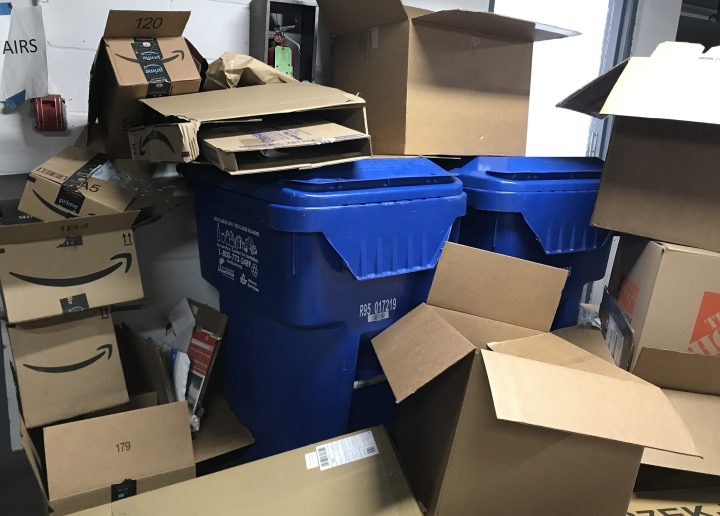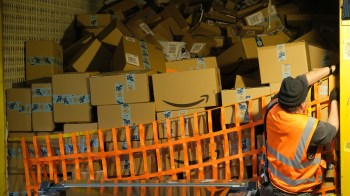
How COVID-19 might change packaging for good

The $900 billion packaging industry was among the many disrupted by COVID-19. Changing consumer shopping habits increased demand for certain packaging products, such as those related to e-commerce and restaurant delivery, while decreasing demand for others.
Matt Reynolds, editor of Packaging World, spoke with “Marketplace” host Kai Ryssdal about what that might mean for the industry in the post-pandemic era. The following is an edited transcript of their conversation.
Kai Ryssdal: I wonder if you find people paying more attention to packaging, both, you know, how it looks when it shows up on your doorstep. But also, you know, some of the not-greats. I mean, I personally, I can’t tell you how many cardboard boxes from Amazon we’ve recycled in the past 12 months, right? It’s just a mountain of stuff.
Matt Reynolds: That’s exactly what people are noticing. And I would say cardboard has increased based on, you know, the, the single-unit size, but there’s a mountain of packaging that exists in retail and food service as well. It’s just hidden in the back room, and the consumer doesn’t see that. Well, I was watching a commercial, might have been an insurance commercial, the other day where they have the “strongest man in the world” breaking down boxes for somebody, so it’s captured the zeitgeist a little bit in that people are aware of packaging, and as such, they’re asking brands to be more aware of it and address sustainability as a function not only of the product contained in the container, but of the container itself.
Ryssdal: I wonder if packaging is an industry ripe for disruption. How might that play out? Just spitball that for me.
Reynolds: Yeah, well, lot’s going on. I mean, we’ve all had the experience of ordering one toothbrush that comes in a box that could hold 20 toothbrushes, and Amazon is working right now quite hard to address this. There’s an acronym — sorry, this is industry lingo — but it’s called SIOC, and the acronym stands for “ships in own container.” The first splash actually happened before the pandemic, Procter & Gamble, that came out with the Tide Eco-Box.
Ryssdal: Sorry, just, just to drill into this SIOC thing for a little while. So I don’t have to open up a box to get my box of whatever it is? The container that it’s contained in, is the shipping container as well?
Reynolds: Exactly. So basically, what was happening is a brand was creating, you know, whatever it might be, Tide, for a retail shelf, and then if somebody wanted to use that in the [e-commerce] channel, well, then you take that item that’s been optimized for a retail shelf and then you have to figure out a way to put it in a three-dimensional square box and give that to somebody without leakage, without any breakage or anything like that. So what we’re seeing brands do with SIOC is to optimize a second set of packages, not for retail, not for food service, but for e-commerce specifically. You mentioned disruption. There’s a couple of brands right now that are setting up these packaging starter kits, where you pay a little bit more upfront for a subscription service where you initially receive a durable package, say a spray bottle for your kitchen sink or whatever that might be. Now you’ve got this beautiful, durable and reusable packages that are just refillable over time.
Ryssdal: Before we turned on the microphone, you were talking to me about Pack Ex[po], which I guess is going to be in September. And I wonder what you’re expecting to see on the convention floor [at] that big packaging expo, as all y’all and the rest of us come out of this pandemic.
Reynolds: Yeah, it’s Pack Expo Las Vegas in late September. Packaging was too efficient. Everything was done “just in time,” everything was done without having to keep inventory. I think one of the big lessons learned for brands is that they need to build a little slack into the system to be able to withstand some of these shocks. At the same time, I think you’ve had a lot of pent-up innovation because brands have been just struggling to keep up. I think we’re gonna see a lot going forward at Pack Expo about packages that are optimized for their specific channel instead of one-package-fits-all, so watching that come together over the coming years is going to be interesting.
There’s a lot happening in the world. Through it all, Marketplace is here for you.
You rely on Marketplace to break down the world’s events and tell you how it affects you in a fact-based, approachable way. We rely on your financial support to keep making that possible.
Your donation today powers the independent journalism that you rely on. For just $5/month, you can help sustain Marketplace so we can keep reporting on the things that matter to you.

















